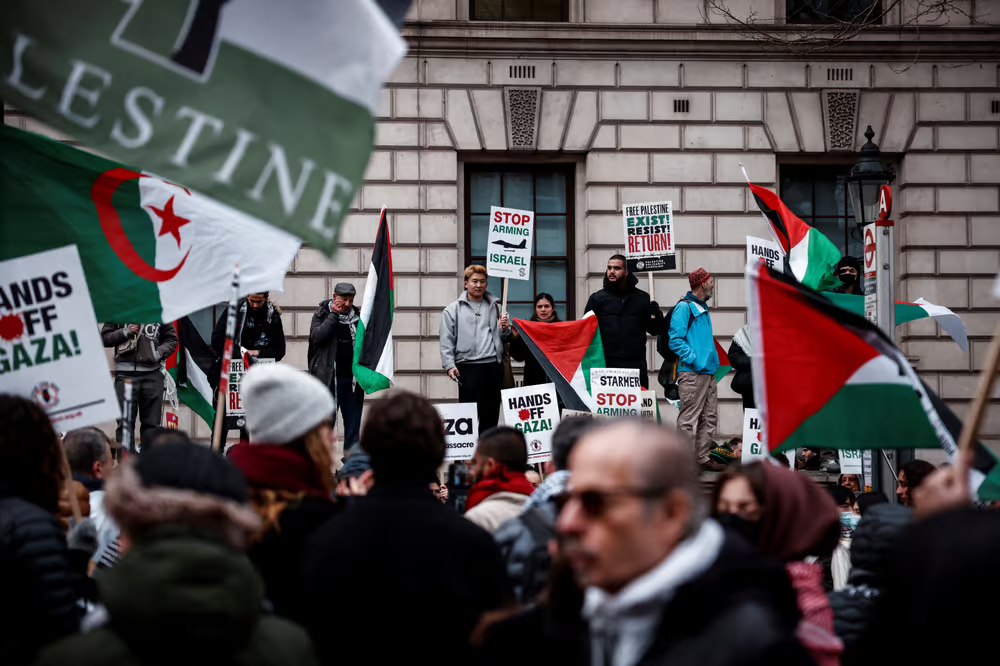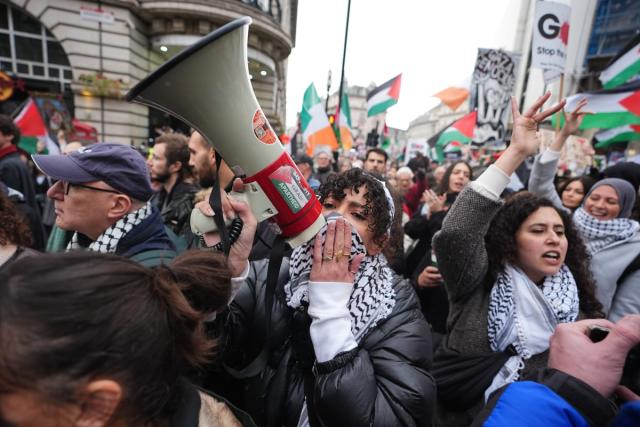A pro-Palestine march in London led to the arrest of eight individuals, including a 79-year-old man who allegedly aimed a Nazi salute at counter-protesters. The demonstration, organized by the Palestine Solidarity Campaign (PSC) and five other groups, took place on Saturday, starting from Whitehall and ending at the US embassy in Nine Elms Lane.
The event, one of the largest since the war between Hamas and Israel began, was met with a counter-protest by Stop The Hate. Police were deployed to keep both groups apart, using barriers and designated areas to prevent clashes.
Clashes and Arrests During Pro-Palestine March in London
The march, attended by thousands of pro-Palestinian demonstrators, aimed to condemn US foreign policy and express solidarity with the people of Gaza.
Protesters held banners reading “Hands off Gaza” and “Stand up to Trump,” referencing a controversial statement made by former US President Donald Trump, who suggested that the US could take ownership of Gaza and transform it into the “Riviera of the Middle East.” The remarks were widely criticized by political figures and activists, fueling further tensions.
During the march, a 79-year-old man was arrested for making what appeared to be a Nazi salute toward counter-demonstrators.
Read : 77 Arrested at Pro-Palestine Rally in London
This act was condemned by both police and protest organizers, as the gesture carries significant historical weight and is often associated with hate speech. Seven other arrests were made for various offenses, including possession of pyrotechnics, criminal damage, and supporting a proscribed organization.
🚨Now: hundreds of thousands marching for Palestine in London 🇵🇸 pic.twitter.com/tiJFh4LRGZ
— Palestine Solidarity Campaign (@PSCupdates) February 15, 2025
The Metropolitan Police maintained a heavy presence throughout the demonstration, ensuring that pro-Palestinian demonstrators and counter-protesters remained separated. Officers imposed Public Order Act conditions to manage the situation, though breaches of these restrictions led to multiple arrests.
The police later stated that while the majority of participants demonstrated peacefully, a small number engaged in unlawful behavior, leading to swift action.
Political Reactions and the Role of Jeremy Corbyn
The protest attracted political figures, including former Labour leader Jeremy Corbyn, who addressed the crowd outside the US embassy. Corbyn strongly opposed Trump’s proposed Gaza plan, calling on the international community to reject the idea.
He described the situation in Gaza as a humanitarian crisis and accused Western governments of failing to take meaningful action to address the suffering of Palestinian civilians.
Corbyn’s speech resonated with many demonstrators, who viewed Trump’s proposal as a form of colonialism. The notion that the US could take control of Gaza and reshape it according to its own interests was seen as an affront to Palestinian sovereignty.

Corbyn’s presence at the protest further highlighted divisions within the UK’s political landscape, with some politicians distancing themselves from his remarks while others echoed his concerns.
Meanwhile, the counter-protest by Stop The Hate sought to highlight concerns over the rhetoric used by some pro-Palestinian demonstrators.
The group positioned itself along the march route, emphasizing their opposition to antisemitism and extremist narratives. Their presence, however, did not prevent tensions from rising, as evidenced by the Nazi salute incident and other clashes reported during the demonstration.
The Broader Implications of the Protest
The arrests during the pro-Palestine march in London underscore the complexities of public demonstrations related to the Israeli-Palestinian conflict.
With emotions running high on both sides, managing protests of this scale poses significant challenges for law enforcement. The event also reignited debates over free speech, protest rights, and the limits of acceptable discourse in politically charged demonstrations.
The arrest of a protester for allegedly making a Nazi salute highlights ongoing concerns about extremism infiltrating public movements.

While the vast majority of demonstrators voiced their views peacefully, isolated incidents like this can overshadow the broader message of the protest. Organizers of the march have condemned hate speech and called for peaceful advocacy, stressing that their movement is about human rights rather than incitement.
The involvement of Jeremy Corbyn also points to the political ramifications of pro-Palestine activism in the UK. His continued participation in such demonstrations keeps the debate alive within Labour circles, where opinions on the Israeli-Palestinian conflict remain divided. Some see his stance as principled advocacy for human rights, while others argue that his presence fuels controversy and polarization.
As tensions persist both in the Middle East and among activist groups in Western nations, future demonstrations are likely to continue drawing large crowds and heightened police attention. The challenge for authorities will be to balance the right to protest with maintaining public order, ensuring that such events do not escalate into violence or hate-fueled confrontations.

